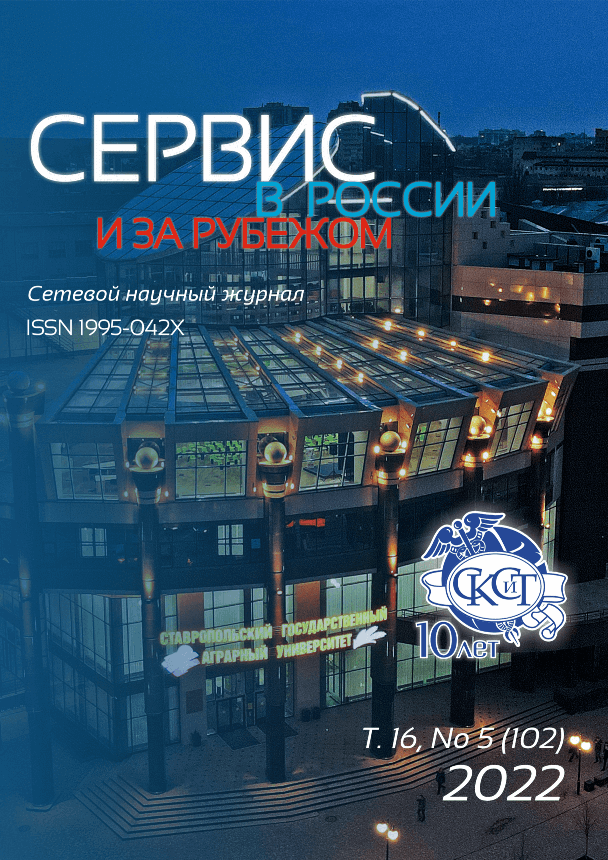Innovative potential of the psychosemantic method in studying the consciousness of future specialists in service and tourism
DOI:
https://doi.org/10.5281/zenodo.7404281Keywords:
experimental psychosemantics, psychosemantic method, private role semantic differential, personality, everyday consciousness, image of a touristAbstract
The relevance of the research is determined by the need to study the consciousness of future specialists to predict the success of their professional activities, as well as the improvement of educational technologies. The article substantiates the innovative nature of using the methods of experimental psychosemantics to study the everyday consciousness of a person, taking into account professional orientation. Using the method of private role semantic differential, it becomes possible to identify an individual system of meanings that reflects the attitude of the subject to various aspects of the surrounding world. The psychosemantic method is highly informative and adequate for studying the ordinary consciousness of a person; it allows predicting the behavior of a person in specific situations. The purpose of this scientific article is to study the everyday consciousness of students at Stavropol State Agrarian University, studying in the direction of "Service" and "Tourism". The article provides a comparative analysis of the results of an experimental psychological study of the image of a tourist in the everyday consciousness of students in various fields of study. The basic constructs of everyday consciousness of students in the field of service and tourism are revealed, through which they perceive the image of a tourist. Students studying in the direction of "Service" perceive the image of a tourist through the following constructs "Communicability-non-communicativeness", "Conflict-non-conflict", and students studying in the direction of "Tourism" – through the constructs "Organization-disorganization" and "Individualism-conformism". The novelty and innovative nature of the research is reflected in the use of the possibilities of the private role semantic differential method to study the everyday consciousness of students of an agrarian university.
Downloads
References
Артемьева Е.Ю. Основы психологии субъективной семантики. М.: Наука; Смысл, 1999. 350 с.
Выготский Л.С. Мышление и речь. М.: АСТ, 2008. 688 с.
Гасанова П.Г., Даудова Б.М. Роль экспериментальной психосемантики в изучении представлений в обыденном сознании // Интерактивная наука. 2017. Т.5. №15. С.68-70.
Грязева-Добшинская В.Г. Технологии диагностики динамики личности и группы на основе интеграции методов проекции и психосемантики // Вестник ЮУрГУ. 2008. №32. С. 37-44.
Доброва В.В., Сысуева В.Г. Использование методов лингвистического, психосемантического и психологического анализа в прикладных исследованиях // Вестник Самарского гос. технич. ун-та. 2016. С. 58-67.
Ибрагимов Э.Э., Нехайчук Д.В., Копачёва Е.И. К вопросу исследования портрета крымского туриста: теоретические и практические аспекты // Сервис в России и за рубежом. 2019. Т.13. №5(87). С. 140-157.
Кутырёв М.А. Применение психосемантического подхода в изучении личности // Новое слово в науке и практике: гипотезы и апробация результатов исследований. 2015. С. 65-69.
Леонтьев А.Н. Деятельность. Сознание. Личность. М.: Смысл, 2005. 352 с.
Лузаков А.А. Психосемантика личностных черт: нормативный и личностный подходы // Человек. Сообщество. Управление. 2008. №3. С. 64-76.
Марин Е.Б., Калита В.В. Образы представителей США и Китая у студенческой молодежи Владивостока // Вестник Кемеровского государственного университета. 2020. Т.22. №1. С.163-174.
Марин Е.Б. Образы представителей России и США у российской молодежи // Вестник Кемеровского гос. ун-та. 2019. Т.21. №1. С. 101-111.
Останова А.О. Общественное мнение как способ формирования общественного сознания // Большая Евразия: Развитие, безопасность, сотрудничество. 2021. С. 141-142.
Петренко В.Ф. Психосемантические аспекты картины мира субъекта // Психология. Журнал Высшей школы экономики. 2005. Т.2. №2. С. 3-23.
Петренко В.Ф. Семантический анализ профессиональных стереотипов // Вопросы психологии. 1986. №3. С. 133-143.
Петренко В.Ф. Основы психосемантики. М.: Эксмо. 2010. 486 с.
Серкин В.П. Методы психологии субъективной семантики и психосемантики. М.: Пчела, 2008. 378 с.
Черданцева А.В. Транскоммуникативный потенциал и коммуникативная направленность личности туриста в различных ситуациях жизнедеятельности // Известия Российского гос. педагогич. ун-та им. А.Е. Герцена. 2010. С. 73-79.
Шмелев А.Г., Похилько В.И., Козловская-Тельнова А.Ю. Практикум по экспериментальной психосемантике. Тезаурус личностных черт. М.: Изд-во Моск. ун-та. 1988. 208 с.
Якушев А.Ж. Формирование инновационного сознания как один из ключевых аспектов обеспечения инновационного сценария экономического развития // Вестник Волгоградского гос. ун-та. 2015. Т.4. №33. С.150-160.
Downloads
Published
How to Cite
Issue
Section
License
Copyright (c) 2022 Drozhzhina, N. B., & Limonova, O. O.

This work is licensed under a Creative Commons Attribution-NonCommercial-ShareAlike 4.0 International License.












